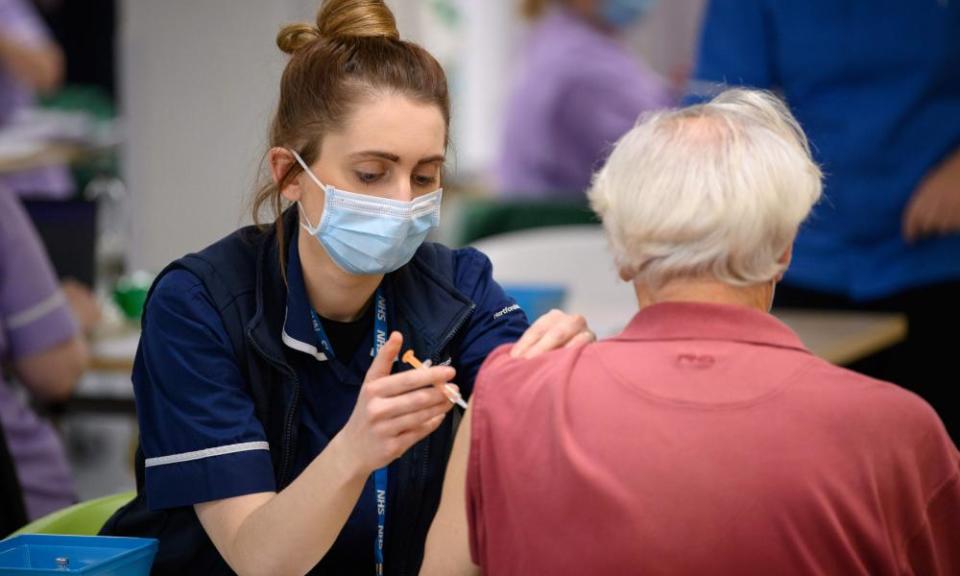All’s not fair in Covid vaccination strategy

I must say that I was surprised by your headline (English care homes ‘sitting ducks’ as GPs refuse Covid vaccine at infected sites, 21 January). I am a semi-retired GP who has, with other retired colleagues, returned to the frontline as a vaccinator. I have seen how hard my colleagues – be they GPs, nurses, pharmacists, administrative staff – have been working to coordinate and administer the Covid vaccines that are available. Your headline rather implies that many GPs are avoiding care homes with Covid outbreaks and this seems inaccurate, negative and misleading.
However, the article does discuss the situation rationally and explain what is happening in various parts of the country. One reason for delays in care homes is the logistical issue associated with taking the Pfizer/BioNTech vaccine to them. The Oxford/AstraZeneca vaccine presents far fewer issues and I am sure that this will enable rapid coverage in community settings.
Dr David Lawrence
Hextable, Kent
• Re your article (Foreign NHS workers could be denied Covid vaccine in England, 22 January), while it is true that for administrative reasons those without an NHS number will not be called for vaccination, if you are living in the UK you should register with a GP. On doing that, you will be given an NHS number and called for vaccination at the appropriate time. It would be far more constructive to tell people this, and that if they have moved house and not registered with a local GP they should do this to be invited to a geographically suitable clinic, than to rail against those without NHS numbers not being vaccinated.
Dr Heather Parry
Watford, Hertfordshire
• How can the government justify holding back future supplies of vaccines from Yorkshire and the north-east just because of the failures in other areas (North-east and Yorkshire vaccine supply cut to catch up lagging regions, 21 January)? What happened to levelling up and rewarding success? This is punishing the region’s greater efficiency and effort in distributing and administering the vaccines.
The north has been in almost continuous restrictions since March 2020, in contrast to the south. Covid rates here have been higher, and recent figures estimated that more than 19% of the population in Yorkshire and the Humber has had Covid – the highest in the country.
The north is disadvantaged in other ways, for example, in having poorer education and employment prospects, so a successful vaccination campaign is all about levelling up, not dragging us down. Why shouldn’t our area be the first to vaccinate all the over-50s? No one wishes illness on other people, but if the situation was the other way round, I doubt the government would have delayed vaccinating those in the south to protect the north. Let’s have some fairness. And if there are logistical problems in the south, bring in the army to tackle it.
Sue Colven
Holmfirth, West Yorkshire
• So vaccine supplies to Yorkshire and the north-east are to be halved to divert them to London for catch-up purposes. Quite right. And given this surprising new emphasis on regional equity, I look forward to the announcement that all financing of infrastructure and the arts in London will be put on hold while funds are redirected to the regions - for catch-up purposes.
Kevin Heymann
Hexham, Northumberland
• On Friday, I had my first inoculation with the Pfizer vaccine. I was given a four-page leaflet that included, on page 3, a short, unhighlighted paragraph telling me: “Protection against Covid-19 may not be effective until at least 7 days after the second dose.” Bearing in mind the lack of prominence given to this written warning and no verbal reinforcement (who reads leaflets?), it is hardly surprising that people who get the vaccine believe that they are good to socialise with others and that 11% say they would probably no longer follow the rules (Researchers warn of another Covid spike if people mix after vaccine, 19 January).
Why has publicity about the dangers of Covid been so vague – unlike hard-hitting campaigns such as those on Aids awareness and the wearing of seatbelts?
Peter Lowe
Newcastle upon Tyne
• The vaccination date for my 100-year-old grandmother has been delayed four times due to unspecified administrative issues. She is in an Edinburgh care home and has contracted Covid while waiting. My 98-year-old grandfather in Inverness has also not received a dose because apparently there is “too much admin”. The SNP claims daily that vaccine supplies are short because it is prioritising care home residents and making “good progress”. How can this be true if two of the oldest people in Scotland, separated by more than 100 miles, are yet to be vaccinated almost seven weeks into the programme?
Name and address supplied

 Yahoo Finance
Yahoo Finance 